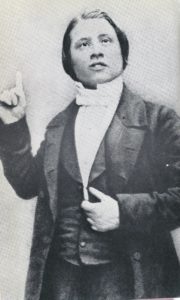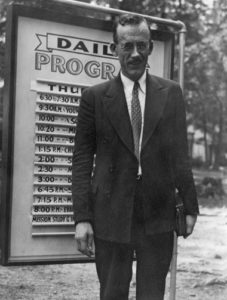
God picked out a couple of schoolteachers, Miss Mills and Miss Thomas, to have a large part in my coming to Christ. Miss Mills was a general science teacher, and I was one of her problem pupils. She wrote my name on her prayer list and prayed for me every day for six solid years.
On the Friday night I was arrested, she was home with Miss Thomas, looking up verses in the Bible, trying to find ten on the subject of salvation which they could give to the young people to memorize. Little did she know that the boy for whom she had been praying for six years was going to memorize those verses. When Sunday came along, I decided to go to young people’s meeting. The pool hall where I played billiards and gambled was about half a block from the church. That evening I looked around to make sure none of the pool hall bays were looking, and I sneaked down to the church and joined in the young people’s service.
….
During the third week of my renewed interest in young people’s meetings I was on my way to work with these 20 verses of Scripture stored away in my memory. I walked along, minding my own business, with my lunch pail in my hand. I was back in my sin. My promise to God, made that night when the policeman was taking me to jail, did not change my life. Going to young people’s meeting on Sunday did not change me either. I was the same guy. I was spending Monday, Tuesday, Wednesday, Thursday, Friday and Saturday nights at the taverns and beer joints, and going to church on Sunday and feeling, “Well’ I’m a little better. I guess a little of this good won’t hurt me after all.”
But Miss Mills was praying, and the Word of God was working; and all of a sudden that morning, as I walked along, the Holy Spirit brought one of those verses to my mind: “Verily, verily, I say unto you, he that heareth My Word, and believeth on Him that sent Me, hath everlasting life…” (John 5:24).
Those words “hath everlasting life” stuck in my mind. I said, “O God, that’s wonderful — everlasting life!” I pulled my little Testament out of my pocket and looked it up, and sure enough, there it was — “…hath everlasting life, and shall not come into condemnation; but is passed from death unto life.”
There for the first time I remember praying, after I had grown to be a man, when I was not in trouble with the police or something like that. I said, “O God, whatever this means, I want to have it.” And just like that the Holy Spirit brought John 1:12 to my mind: “But as many as received Him, to them gave He power to become the sons of God…” I then looked up that verse, and there it was, just as I remembered it. “O God,” I said, “whatever it means to receive Jesus, I do it right now.” That was my new birth.
— Dawson Trotman, Born to Reproduce



